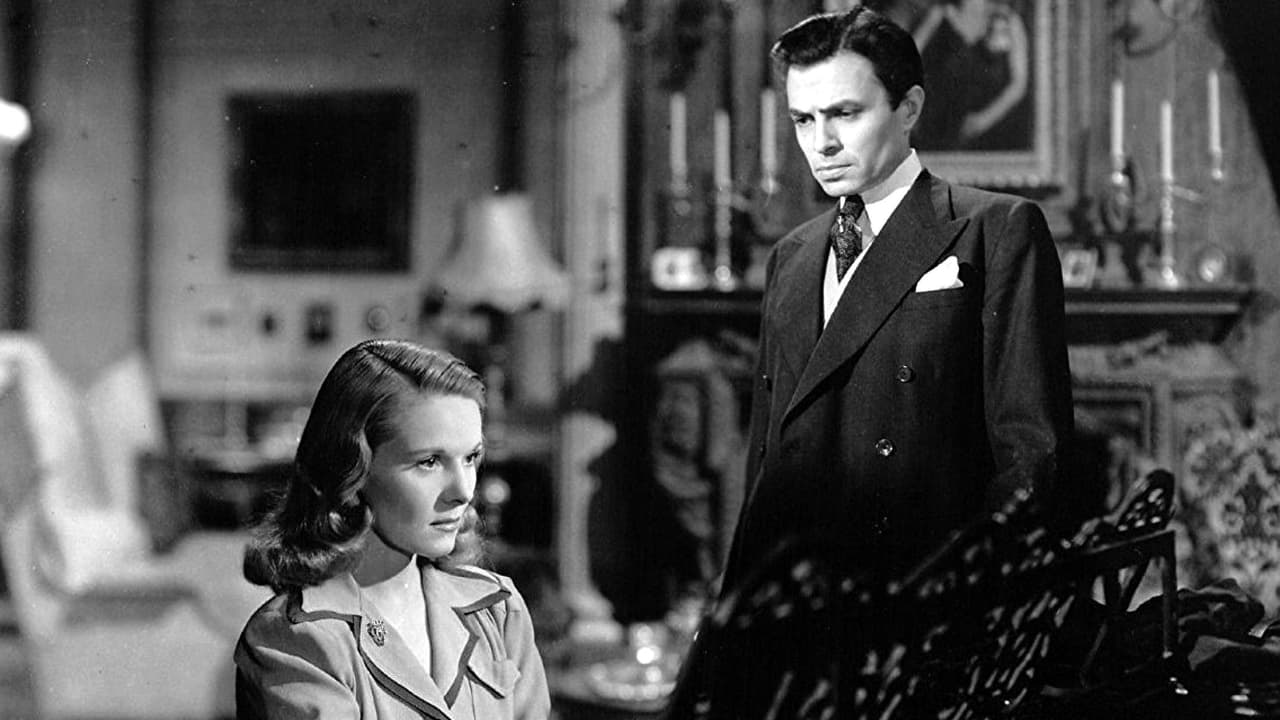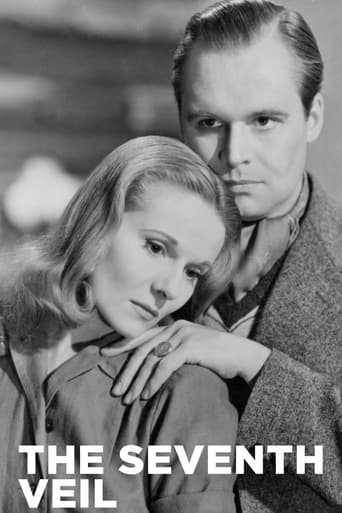

Whoever thought control could look so handsome? In The Seventh Veil, Ann Todd comes under the control of her music teacher and guardian James Mason, and even though he's incredibly overwhelming, he's also incredibly handsome. He insists she devote her entire life to her piano playing and prevents her from having any form of a social life. As in many stories of this kind, the well-intentioned trainer becomes overbearing, and the meek pupil loses it.Ann Todd is very convincing as weak and meek, and James Mason is very convincing as being intense and controlling. When the main characters are written and performed well, you're off to a good start. This isn't normally my favorite time of love story, but since James Mason is so handsome, it's easy to forgive him and hope he gets the girl. Give it a watch and see if you agree!
... View MoreConcert pianist Francesca Cunningham (Ann Todd) flees from her hospital bed late one evening and attempts suicide by tossing herself off of a bridge. Accomplished and successful artist that she is Francesca is a car wreck in the relationship department and once rescued agrees to some intense therapy by Dr. Larson (Herbert Lom) employing the "Seven Veils Theory." After focusing on a school days setback she moves on to boyfriends and the overwhelming supervision of her distant cousin and patron Nicholas (James Mason). Some movie stars are known for dispatching heroes and villains with guns or some other form of weaponry, James Mason does it with words and in The Seventh Veil he lands some savage blows with magnificent condescension and curtness on his protégé. Cold, distant, he remains firmly on point at creating his own Trilby and dashing her "petty" desires. Ann Todd is fine as she moves well between vulnerability and an icy coolness, though her early teen look is a bit of a stretch. Lom as Larson is both assured and convincing showing controlled understanding where the equally sophisticated Nicholas has none. The film with nearly every scene an interior retains a crisp look throughout while editing and cinematography economically tell the story. Director Compton Bennett directs this psychological drama ably, weighting each character with enough interest to retain pertinence and intention nebulous. Well crafted as the picture is overall it is Mason's bravura Svengali that remains with you.
... View MoreAs the film starts, we see a woman escaping from what appears to be a sanatorium. She runs through deserted streets up to a bridge; it becomes clear she wants to commit suicide. In flashbacks, we get to know the story of Francesca Cunningham, the woman at the center of this tight psychological drama.Francesca, an orphan, is made to go and live with her guardian, Nicholas, a solitary man that was not ready to assume the responsibilities that came with his duty. Several years her senior, Nicholas does not know what to do with the young woman living in his large house in London. It takes little before he realizes Francesca has a gift for playing the piano. He encourages her to enter an institution where her talents can be better developed.Nicholas pushes Francesca to the limit until he realizes she is ready to take her place in the music world. When he realizes Francesca has developed an affection toward a young band player, he takes her away with the excuse she must go on with her studies until she becomes a soloist. Nicholas, a cold man, never expresses any sympathy toward Francesca.Nicholas decides to have Maxwell Leyden, a famous painter to do her portrait. Francesca realizes she has stirred something in Max, and believes she is in love with him. Trying to escape Nicholas' manipulation, they decide to run away, only to get into a serious accident that lands her at a hospital. Her injuries to her hands send her into a panic, but with the help of Dr. Larsen, a Freudian man, he is able to unsnarl the tangled web in Francesca's mind. When all is well, it does not surprise us her choice for the man she really loves.A 1945 British classic, directed by Compton Bennett, this is a fine example of the better made melodramas of the era. It had all the right elements that were necessary for a good story. In a way is a rework on the Pygmalion legend, with musical overtones. The screenplay by Muriel and Sidney Box, was based on their original story.The great James Mason was perhaps too young to play Nicholas, but he makes a valuable contribution to our enjoyment of the film. Mr. Mason always delivered, as he does with this enigmatic and selfish man, a natural ingredient for this genre. Ann Todd plays Francesca. To her credit, her performance in front of the piano looks real. Herbert Lom is seen as Dr. Larsen, the man that sees all that is wrong with his patient and sets a plan to cure her of her fears, as well as her insecurities. Hugh McDormott and Albert Lieven are seen as Peter and Maxwell, the men that took an interest in Francesca."The Seventh Veil" is worth a look by fans of this genre.
... View MoreThis is a true classic. If you can appreciate a film as a work of art, regardless of whether it represents the genre you like, then this will be in your list of great movies. Like all movies about relationships between men and woman, it will be open season for the kooks trying to work off their own personal problems, but take it at its face value. Ignore the political correctness parasites and appreciate the movie.James Mason's portrayal of a man who was hiding from the world but eventually found something to bring him back into it - a flawed but selfless love - is a work of genius. Ann Todd is excellent also, as the young girl who becomes a famous pianist under his direction. Herbert Lom, playing the character role of a psychiatrist, is brilliant.It is a melodrama, but very, very well done, with great acting.
... View More